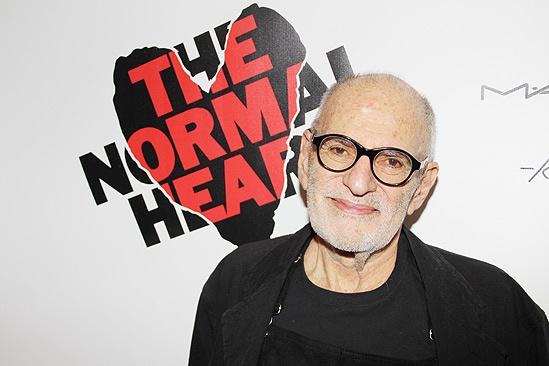
In a candid interview with Parade.com, A Normal Heart playwright Larry Kramer discusses the HBO screen adaptation of his landmark 1985 play about the AIDS crisis, his thoughts on Hollywood actors playing gay, equal marriage, and more. He also shared his controversial thoughts on past U.S. presidents (some he deems homosexual) and government reaction to AIDS victims.
Below are some of the highlights from the article, published on EquallyWed.com with full permission. For the full story, click here.
Q Glee creator Ryan Murphy is directing The Normal Heart. Brad Pitt’s company, Plan B, is producing for HBO. Did you have trouble casting The Normal Heart because actors are afraid to play gay?
A “Yes. In ’84, ’85, with the play, it was hard to get actors to go gay. We waited forever for Al Pacino, who diddled making up his mind. I was very happy with Brad Davis.” [Brad Davis played Ned Weeks, the lead in the original stage production of The Normal Heart at New York’s Public Theater. Pacino declined the role.]
In The Normal Heart, you attack our government’s disregard for AIDS victims. Was that apparent indifference due to the kind of people who first got infected in America—gays, people of color, addicts?
“Of course. It’s because of who gets AIDS. I consider a great deal of what was done to us [by the government] evil.”
But there were early heroes in the AIDS battle. You and others were arrested many times in protests. Elizabeth Taylor risked a lot.
“Let’s talk about Elizabeth Taylor. She was buddies with Reagan. She never once went to him about this. She lent her name, but she didn’t use her power to confront the powers that be.”
When you were a student at Yale in the 1950s, did you know you were gay?
“I was very unhappy. I thought I was the only gay person in the world.”
The only gay person? Is that why you attempted suicide at Yale?
“I certainly didn’t see anyone [gay] there. And I got very depressed one afternoon and did it.”
You took an overdose, right?
“The campus police rushed me to the hospital and pumped my stomach. My brother was the first person I saw when I came to. We were very close. Because of him, I was able to stay in school and start psychoanalysis in New Haven. So that’s what I did.” [Kramer’s brother, Arthur, a lawyer, died in 2008.]
Why are gay people hated?
“I don’t know, but we are. It makes no sense. I don’t know why [Rep.] Michelle Bachmann hates me. I mean, what’s in it for her? Why should she care? I don’t know why that whole Tea Party hates us. Leave us alone already.”
Do you think we will ever have a gay president?
“Lincoln was gay.”
He was?
“We’ve had a number of gay presidents.”
Who else?
“Franklin Pierce. Andrew Jackson.”
You were diagnosed with HIV in 1988?
“Yes.”
Then your liver failed and you had a liver transplant in 2001.
“I was told that I only had six months to live, and they weren’t transplanting people with HIV. I was at death’s door. I weighed 120 pounds. I wasn’t upset. I thought I’d contributed to the world and been well used. At the very, very last minute, suddenly they wanted HIV-positive people for a transplant study. They had done seven of them. I was the eighth.”
Let’s talk about the Supreme Court’s June 26 decisions legalizing equal marriage in California and overturning DOMA. How do they affect you?
“David and I are going to get married!” [David Webster, an architect, is Kramer’s partner.]
How long have you been together?
“Since 1995.”
When are you going to get married?
“As soon as we can.”
You must’ve been overjoyed at the court’s ruling.
“I couldn’t believe it! You know, they gave us what we deserved, but they kept back some really important stuff. So, I’m not going, ‘Glory, hallelujah,’ like everybody is. What they did will require a lot more lawsuits to clarify stuff that they refused to rule on. But we got rid of DOMA in the 13 states [and District of Columbia] where gay people can marry, so we’ll get [federal] benefits there. I was terrified that I’d die and David would have to give so much money to the government from our house that he wouldn’t have any money left.”
Because of death duties?
“Yes. I’m grateful for that. We said we wouldn’t get married until we got the benefits.”
Are you hopeful about the future of gays in America?
“I’m essentially a hopeful person. We’ve weathered a storm here, yes, because we fought back. It’s not been easy.”
—Dotson Rader
Photo by Bruce Glikas for Broadway.com





























